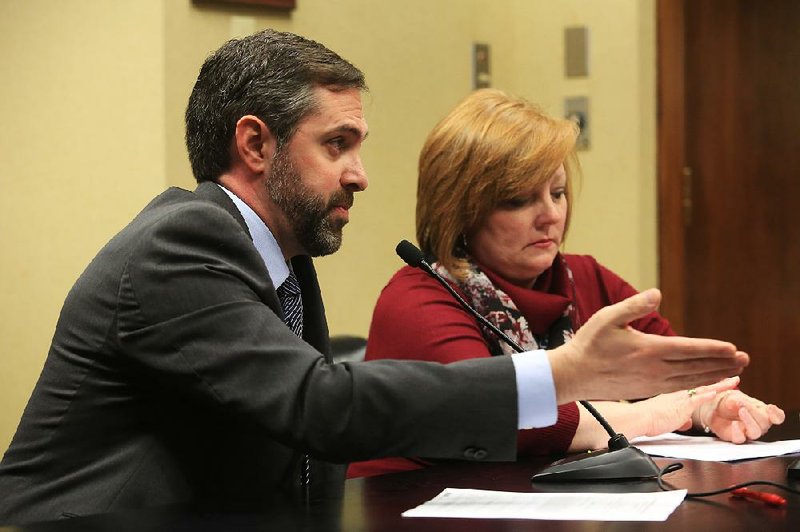Legislation that would eliminate the possibility of life without parole for people convicted of crimes they committed as juveniles was advanced by an Arkansas legislative committee Tuesday.
House Bill 1197, sponsored by Rep. Greg Leding, D-Fayetteville, and Sen. Missy Irvin, R-Mountain View, would amend state sentencing statutes to eliminate the possibility of a life-without-parole sentence for offenders who were under age 18 when they committed their crimes. The legislation, which was tabled in February because of concerns raised by the state's prosecuting attorneys, passed out of the House Judiciary Committee on Tuesday on a voice vote.
The bill will head to the floor of the Arkansas House of Representatives today.
Leding, who presented the bill in committee, said he and Irvin made several amendments to make it more palatable to prosecutors.
"The amendment addresses many of the concerns brought up by the committee during the first hearing and many of the concerns of the prosecutors," he said. "Though it was never our intent that good behavior could in any way reduce those minimum sentences, we have added language that makes it absolutely clear that good behavior will not reduce those sentences. ... Lastly, the bill is no longer retroactive. We dropped retroactivity. I know that was a major concern of the prosecutors, and the bill would only affect cases moving forward."
The amendment dropped any retroactivity. The 56 Arkansas inmates convicted for crimes committed as juveniles and serving life without parole would not be eligible for parole under the bill. The 65 inmates convicted for juvenile crimes and serving life with parole would not be eligible for parole any sooner.
If the bill passes, it would change the required jail time before people convicted of crimes as juveniles in the future would be eligible for parole.
Under the bill, those who commit nonhomicide crimes and those convicted of murder but who do not actually take a life or intend to take a life would be eligible for parole after 20 years.
Under the amendment, those who are convicted of murder and sentenced to life would be eligible for parole in 30 years. The original bill set that eligibility at 28 years.
The amendment also makes it clear that good behavior credits would not make any of the affected inmates eligible for earlier parole. The amendment would also require a mental health evaluation when a juvenile convicted of first-degree murder or capital murder enters the prison system and before parole hearings. The bill also increases the victim notification requirements when the juveniles are eligible for parole.
Lori Kumpuris, the deputy prosecutor coordinator for the Arkansas Prosecuting Attorneys Association, said the amendment had addressed all the issues raised by her association.
"We've worked with him on these amendments, and with the amendments we are withdrawing our opposition to the bill," she said.
But for some on the committee, the changes were not enough to win support. Rep. Rebecca Petty, R-Rogers, a victims' rights advocate whose daughter was murdered, raised objections before voting against the measure.
"So an additional two years for a murderer?" she asked, referring to the increase in minimum sentences before parole from 28 to 30.
HB1197 comes two years after the Legislature passed Act 1490 of 2013 to get the state's sentencing laws in compliance with a 2012 U.S. Supreme Court ruling that eliminated mandatory life-without-parole sentences for juveniles.
In Miller v. Alabama, which was heard in tandem with the Arkansas case Jackson v. Hobbs, the court found that state-mandated sentences of life without parole for minors violated the Eighth Amendment's prohibition against cruel and unusual punishment. However, the ruling did not bar juries from deciding to send young offenders to prison for life without parole.
Before Act 1490, state law required that anyone convicted of capital murder be sentenced either to death or to life without parole. Act 1490 changed the law to exclude youthful offenders from the mandatory life-without-parole sentences, but still allowed juries to opt for that punishment if a case warranted.
In December, the U.S. Supreme Court agreed to hear a Louisiana case that would clarify the court's stance on retroactively applying its Miller v. Alabama ruling, but it's uncertain when that case will be decided.
Metro on 03/25/2015


